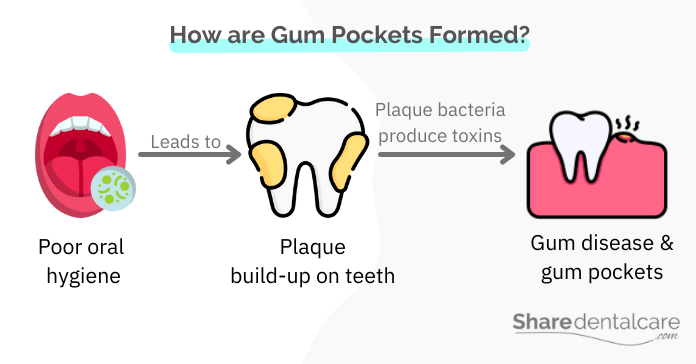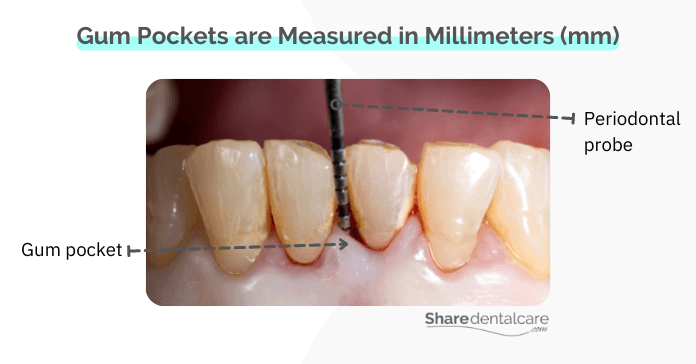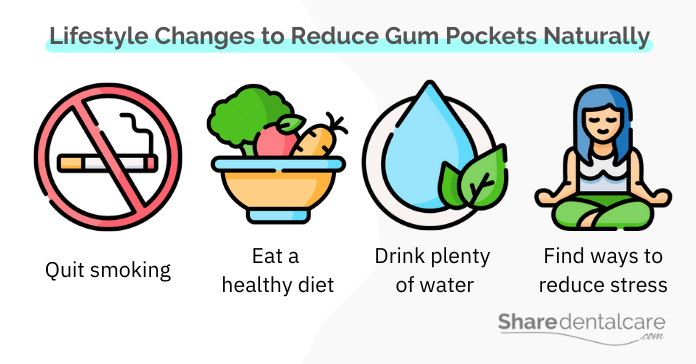Gum pockets are a sign of gum disease. They are spaces between gum and tooth where bacteria can accumulate, leading to the progress of gum disease. The depth of gums pockets indicates how advanced gum disease is. The more pockets and the deeper they are, the more serious the disease. In this blog post, we will discuss how gum pockets are formed and how to reduce gum pockets naturally.
How are Gum Pockets Formed?
Poor oral hygiene causes the accumulation of plaque on the teeth. Dental plaque is a sticky film of bacteria that builds up on your teeth every day. Plaque bacteria produce acids that irritate the gums, causing gum disease. The gums become inflamed and swollen or puffy. Over time, the gums begin to pull away from teeth, creating small spaces between teeth and gums where bacteria can accumulate. These spaces are known as gum pockets (periodontal pockets). Other signs and symptoms of gum disease include:
- Red, swollen gums.
- Bleeding gums when brushing or flossing.
- Persistent bad breath or a bad taste in the mouth.
- Loose teeth.
If gum disease is left untreated, the infected gum pockets can get deeper, and the gums may eventually pull away completely from the teeth, leading to tooth loss. So, if you notice any signs of gum disease, it is important to schedule an appointment with your dentist for treatment. While waiting for your appointment, you can try to reverse gum disease and reduce the depth of gum pockets naturally at home.

Size & Severity
Healthy gums are tightly attached to the teeth and have no space between them. The gum pockets process starts with gingivitis infection, an early stage of gum disease. You can reduce gum pockets naturally by improving your oral hygiene. However, if the disease progresses to periodontitis, gum pockets become deeper, and you can’t reduce them naturally. At this stage, you must undergo treatment by your dentist. The size and severity of gum pockets are as follows:
- 1 to 3 mm: normal pocket depth.
- 4 to 5 mm: mild periodontitis
- 6 mm or more: moderate to advanced periodontitis
Whether you can reduce gum pockets naturally or not depends on the size and severity of your gum pockets. Therefore, you should visit your dentist to determine the severity of the gum pockets. Your dentist will use a periodontal probe to measure the depth of your gum pockets.

Causes & Risk Factors
Many factors can increase your risk of developing gum pockets. Some of these include:
- Poor oral hygiene.
- Smoking cigarettes or using tobacco products. Read more about gum disease from tobacco smoking.
- Hormonal changes during puberty, pregnancy, and menopause.
- Stress.
- Vitamin C deficiency.
- Certain medications that cause dry mouth.
- Certain medical conditions, such as diabetes.
To reduce gum pockets naturally, you should identify the underlying cause.
How to Reduce Gum Pockets Naturally?
There are several ways to reduce gum pockets naturally, including improving your oral hygiene, using home remedies, and making lifestyle changes.
Improving Oral Hygiene
You can reduce gum pockets naturally by improving your oral hygiene habits. Proper oral hygiene habits include:
- Brushing your teeth at least twice a day with a soft-bristled toothbrush.
- Use fluoride toothpaste to fight bacteria.
- Flossing your teeth at least once a day to remove plaque between teeth.
- Using an antiseptic mouthwash to reduce bacteria.
Home Remedies to Reduce Gum Pockets Naturally
There are a few home remedies that can help reduce gum pockets naturally. These include:
- Saltwater rinse: mix 1/2 teaspoon of salt in a glass of warm water. Then, rinse your mouth with the solution for 30 seconds. Repeat this process 3 times every day.
- Oil pulling: it is a process in which you swish oil around your mouth for 5 to 10 minutes, for example, using coconut oil, sunflower oil, or clove oil. However, the American Dental Association doesn’t recommend oil pulling, since there is limited evidence on its effectiveness.
- Vitamin C: it is beneficial for the gums and helps reduce inflammation. You can take a vitamin C supplement or eat foods rich in vitamin C, such as oranges, bell peppers, strawberries, broccoli, kiwi fruit, and grapefruit. Consult your doctor to determine the right dosage for you.
- Omega-3 fatty acids: These fatty acids help reduce inflammation and support gum health. You can get omega-3 fatty acids from fish oil supplements, flaxseeds, chia seeds, hemp seeds, and walnuts. Consult your doctor to determine the right dosage for you.
- Aloe Vera: it has anti-inflammatory properties that can reduce gum inflammation. You can use aloe vera gel by applying it to the gums directly.
Lifestyle Changes to Reduce Gum Pockets Naturally
These lifestyle changes can also help reduce gum pockets naturally:
- Quit smoking: smokers have twice the risk of developing gum disease than nonsmokers. If you can’t, then reduce your smoking as much as possible. Read more about how gums heal after quitting smoking.
- Reduce stress: stress can increase the risk of gum disease. Find ways to reduce your stress, such as yoga, meditation, and deep breathing.
- Eat a healthy diet: reduce your intake of sugar and carbohydrates such as cookies, cakes, white bread, candy, and soda. Eat plenty of fruits, vegetables, and whole grains.
- Drink plenty of water: water keeps your mouth moist and helps reduce the build-up of plaque and bacteria in your mouth.
- See your dentist regularly: see your dentist every 6 months for a check-up and professional teeth cleaning.

Can Home Remedies Reduce Gum Pockets Naturally?
It depends on the size and severity of gum pockets. Home remedies can help reduce small gum pockets naturally, but you still need to see your dentist for professional teeth cleaning. This is because you can’t remove all the plaque and tartar from gum pockets with home remedies. Also, home remedies don’t treat the underlying causes.
Moderate to severe gum pockets can’t be treated with home remedies and need to be treated by a dentist. Treatment may include scaling & root planing, antibiotics, and surgery.
Read more about reversing periodontal disease bone loss.
How to Reduce Gum Pockets Naturally – Conclusion
Gum pockets are spaces that develop between your teeth and gums. They usually occur as a result of gum disease. The treatment of gum pockets depends on their size and severity. If gum pockets are small, you can reduce them naturally by improving your oral hygiene habits, home remedies, and lifestyle changes.
However, you still need to visit your dentist for checkup and professional teeth cleaning. Home remedies can’t treat the underlying causes. Also, home remedies are not effective with moderate to severe gum pockets, so you need to visit your dentist for treatment.